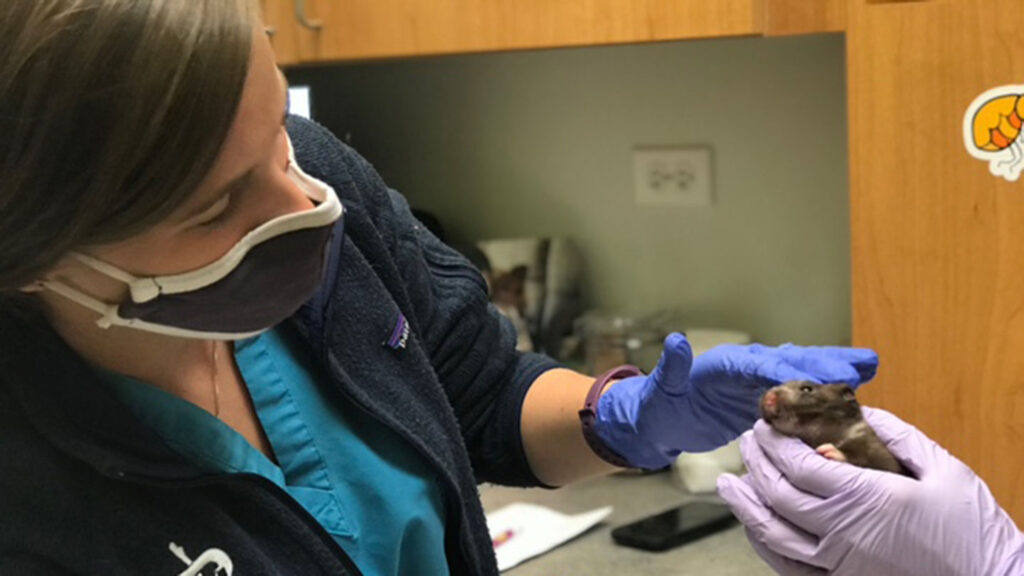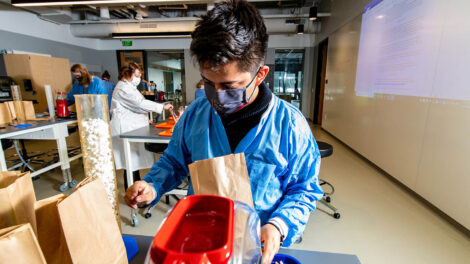Veterinarian explains how her experience as a bio major at Lafayette helped her fulfill her dream of caring for animals
Ariel Aguiar ’12 is a veterinarian who practices at VCA Animal Care Center of Chicago. She specializes in treating cats, dogs, and other small mammals such as rats, hamsters, guinea pigs, and more. In her role, she serves as not only a general practitioner for her pint-sized patients, but also as a dentist, dermatologist, surgeon, oncologist, radiologist, and much more. Aguiar earned a Master of Science in laboratory animal science from Drexel University as well as a Veterinariae Medicinae Doctoris (V.M.D.) from University of Pennsylvania. She holds a Bachelor of Science degree in biology from Lafayette College.

Ariel Aguiar ’12 is a veterinarian who practices at VCA Animal Care Center of Chicago.
What do you love about the work you do? How does it feel to be able to change the lives of animals (and their owners) by keeping them healthy?
Our clients expect us to be all encompassing for their pets’ care, and this means there is never a boring day at work. I learn something new every day; therefore, it is challenging and very rewarding. When I can ease a client’s mind about their sick or injured pet’s condition, or answer the numerous questions a new pet owner brings to their first appointment, I feel that is a day well spent.
What sparked your interest in veterinary medicine? Was this something you always wanted to do?
I have always wanted to be a veterinarian, ever since I was a little girl. In school, as a child, I always gravitated toward biology and science classes; science was always my favorite subject. Therefore, I came into Lafayette knowing exactly what I wanted to do with my life and set about figuring out how to make that happen. I grew up with a cat, dog, bird, guinea pig, and hamster, so I had plenty of animal exposure throughout my childhood. For the last month of my senior year of high school, we all did internships, and mine was at a small animal hospital as a technician and receptionist. I ended up working there during all school breaks and after college until I started veterinary school. Working there confirmed my desire to become a veterinarian.
Were there any particular professors, courses, or experiences that were particularly influential to you during your time at Lafayette and that continue to impact your work today?
I did an independent study under my adviser, James Dearworth [associate professor of biology and neuroscience], during my senior year at Lafayette. My research aimed to determine whether red-eared slider turtles are capable of remembering the location of their native ponds. This exposure to research acted as a great foundation as I moved into my master’s degree and pursued numerous other research projects then and during my time in veterinary school. It gave me experience in creating a research topic, conducting research, collecting and analyzing data, and presenting at a research conference.
I also took Dr. Dearworth’s Comparative Vertebrate Anatomy and Anatomy of Vision courses. In veterinary school, we dissected and studied numerous vertebrate species, and I had already had that exposure during Dr. Dearworth’s classes, where I was able to dissect and study a cat, among other vertebrates.
How did your other experiences at Lafayette help lay the foundation for your career?
The various leadership roles I held in club soccer, other clubs, and my sorority while I was a student at Lafayette helped me to now be a stronger leader as a veterinarian, since we are leaders in the hospital or clinic setting. This has led to me helping to train new veterinarians and technicians, and I hope to do more of this in the future.
The summer before my senior year at Lafayette, I also took part in a summer course and internship program in London, where I interned at a regional veterinary laboratory. There, I learned all about the day-to-day applications of subjects I had learned in school and now use daily for my patients, including biochemistry, microbiology, hematology, and more. The internship helped form my interest in laboratory medicine and research, and it was while completing this internship that I learned about the master’s program I would eventually start the following summer.
What are your goals for the future?
I hope to work my way up to medical director or another leadership role within a veterinary clinic in the future. This way, I can mentor other doctors and staff, and I can help our clients have the best quality medicine and service possible. I plan to continue to work as a small animal veterinarian and serve any worried pet parent that comes my way to the best of my abilities.
What kind of advice can you offer to current biology students about how to apply what they’re learning to their future careers?
Take advantage of all the opportunities Lafayette College can afford you. Do the research project and/or thesis, take the internship, shadow that local doctor, take all the lab courses you can. These experiences could assist you during your future career and help guide you into that career.


